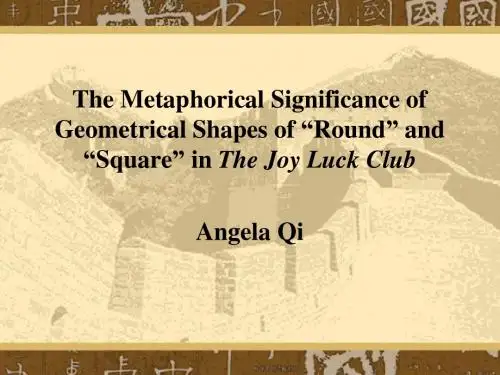喜福会英文版.ppt1资料讲解
- 格式:ppt
- 大小:326.00 KB
- 文档页数:7
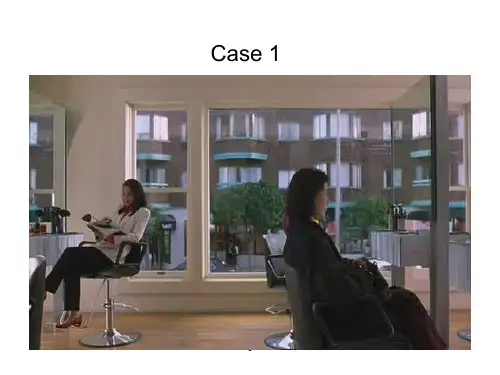
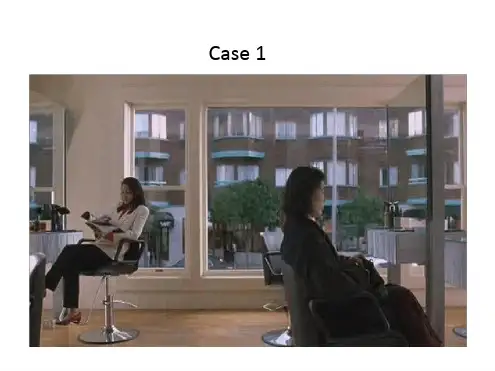
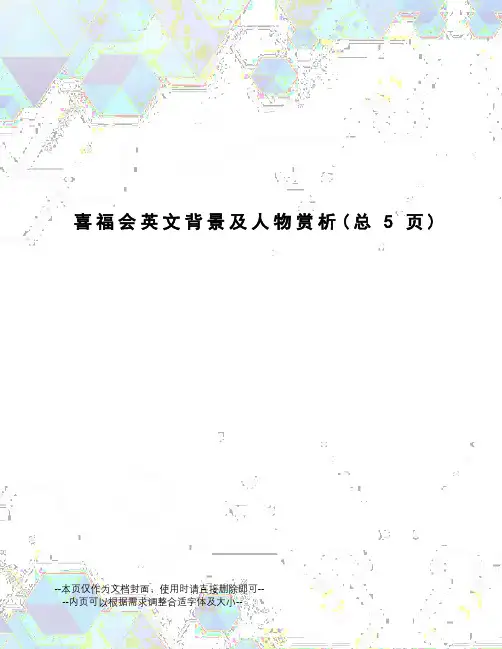
喜福会英文背景及人物赏析(总5页)--本页仅作为文档封面,使用时请直接删除即可----内页可以根据需求调整合适字体及大小--The Joy Luck Club (1989) is a best-selling novel written by Amy Tan. It focuses on four Chinese American immigrant families in San Francisco, California who start a club known as "the Joy Luck Club," playing the Chinese game of mahjong for money while feasting on a variety of foods. The book is structured somewhat like a mahjong game, with four parts divided into four sections to create sixteen chapters. The three mothers and four daughters (one mother, Suyuan Woo, dies before the novel opens) share stories about their lives in the form of vignettes. Each part is preceded by a parable relating to the game.In 1993, the novel was adapted into a feature film directed by Wayne Wang and starring Ming-Na, Lauren Tom, Tamlyn Tomita, France Nguyen, Rosalind Chao, Kieu Chinh, Tsai Chin, Lisa Lu, and Vivian Wu. The screenplay was written by the author Amy Tan along with Ronald Bass. The novel was also adapted into a play, by Susan Kim, which premiered at Pan Asian Repertory Theatre in New York. CharactersMothersSuyuan WooDuring the Second World War, Suyuan lives in China while her husband at the time served as an officer in Chungking (Chongqing). She starts the original Joy Luck Club with her three friends to cope with the war. There is little to eat, but they pretend it is a feast, and talk about their hopes for the future. On the day of the Japanese invasion, Suyuan leaves her house with nothing but a bag of clothes, a bag of food, and her twin baby daughters.During the long journey, Suyuan contracts such severe dysentery that she feels certain she will die. Fearing that a dead mother would doom her babies' chances of rescue, she reluctantly and emotionally leaves her daughters under a barren tree, together with all her belongings, along with a note asking anyone who might find the babies to care for them and contact the father. Suyuan then departs, expecting to die. However, she is rescued by a truck and finds out her husband has died. She later remarries, comes to America, forms a new Joy Luck Club with three other Chinese female immigrants she met at church, and gives birth to another daughter. But her abandonment of the twin girls haunts her for the rest of her life. After many years, Suyuan learns that the twins were adopted, but dies of a brain aneurysm before she can meet them. It is her American-born daughter Jing-mei who fulfills her long-cherished wish of reuniting with her elder twin half-sisters.As Suyuan dies before the novel begins, her history is told by Jing-mei, based on her knowledge of her mother's stories, anecdotes from her father, and what the other members of the Joy Luck Club tell her.An-Mei HsuAn-Mei is raised by her grandparents and other relatives during her early years in Ningbo after her widowed mother shocks the family by becoming a concubine to a middle-aged wealthy man after her first husband's death. This becomes a source of conflict for the young An-Mei, as her aunts and uncles deeply resent her mother for such a dishonorable act. They try to convince An-Mei that it is not fitting for her to live with her disgraced mother, who is now forbidden to enter the family home. An-Mei's mother, however, still wishes to be part of her daughter's life. After An-Mei's grandmother dies, An-mei moves out to live with her mother in the home of her mother's new husband, Wu-Tsing. An-Mei learns that her mother was coerced into being Wu-Tsing's concubine through the manipulations of his Second Wife, the favorite. This woman arranged for An-Mei's mother, still in mourning for her original husband, to be raped by Wu-Tsing. The stigma left An-Mei's mother with no choice but to marry Wu-Tsing and become his new but lowly Fourth Wife. She later lost her babyson to Second Wife, who claimed the boy as her own child to ensure her place in the household. Second Wife also tried to win over An-mei upon her arrival in Wu-Tsing's mansion, giving her a necklace made of "pearls" that her mother later revealed were actually glass beads by crushing one with her teacup. An-Mei's mother re-knots the necklace to hide the missing bead, but now An-Mei knows the truth about Second Wife's seeming generosity.Wu-Tsing is a highly superstitious man, and Second Wife takes advantage of this weakness by making false suicide attempts and threatening to haunt him as a ghost if he does not let her have her way. According to Chinese tradition, a person's soul comes back after three days to settle scores with the living. Wu-Tsing, therefore, is known to be afraid to face the ghost of an angry or scorned wife. After Second Wife fakes a suicide attempt to prevent An-Mei and her mother from getting their own small house, An-Mei's mother successfully commits suicide herself, eating tangyuan laced with lethal amounts of opium. She times her death so that her soul is due to return on the first day of the new year, a day when all debts must be settled lest the debtor suffer great misfortune. With this in mind, Wu-Tsing promises to treat his Fourth Wife's children, including An-Mei, as if they were his very own flesh and blood by an honored First Wife. When Second Wife attempts to disrupt this, An-Mei crushes the fake pearl necklace Second Wife gave her beneath her feet to show her awareness of all Second Wife's deception and to symbolize her new power over Second Wife, who now fears her and realizes the bad karma she has brought upon herself.An-Mei later immigrates to America, marries, and gives birth to seven children (four sons, three daughters). The youngest, a son named Bing, drowns at age four.Lindo JongLindo is a strong-willed woman, a trait that her daughter Waverly attributes to her having been born in the year of the Horse. When Lindo was only twelve, she was forced to move in with a neighbor's young son, Huang Tyan-yu, through the machinations of the village matchmaker. After some training for household duties through her in-laws, she and Tyan-yu married when she turned sixteen. She soon realized that her husband was just a little boy at heart and had no sexual interest in her. Lindo began to care for her husband as a brother, but her cruel mother-in-law expected Lindo to produce a grandson. She restricted most of Lindo's daily activities, eventually ordering her to remain on bed rest until she could conceive and deliver a child.Determined to escape this unfortunate situation, Lindo carefully observed the other people in the household and eventually formed a clever plan to escape her marriage without dishonoring herself or her family. She managed to trick her young husband's family into believing that he was actually fated to marry another girl who was already pregnant with his "spiritual child", and that her marriage to Huang Tyan Yu would only bring bad luck to the family. In reality, the girl in question was a mere servant in the household and indeed pregnant, but abandoned by her lover.Freed from her first marriage, Lindo decided to emigrate to America. She married a Chinese-American man named Tin Jong and has three children: sons Winston and Vincent, and daughter Waverly.Lindo experiences regret over losing some of her Chinese identity by living so long in America (she is treated like a tourist on a visit to China); however, she expresses concern that Waverly's American upbringing has formed a barrier between them.Ying-Ying "Betty" St. ClairFrom a young age, Ying-Ying is told by her wealthy and conservative family that Chinese girls should be meek and gentle. This is especially difficult for her, she feels, because she is a Tiger character. She begins to develop a passive personality and repress her feelings as she grows up in Wuxi. Ying-Ying marries a charismatic man named Lin Xiao, not out of love, but because she believed it was her fate. Her husband is revealed to be abusive and openly has extramarital relationships with other women.When Ying-Ying discovers she is pregnant, she gets an abortion and makes the decision to live with her relatives in a smaller city in China.After ten years, she moves to Shanghai and works in a clothing store, where she meets an American man named Clifford St. Clair. He falls in love with her, but Ying-Ying cannot express any strong emotion after her first marriage. He courts her for four years before she agrees to marry him after learning that Lin Xiao had died, which she takes as the proper sign to move on. She allows Clifford to control most aspects of her life, mistranslating her words and actions, and even changing her name to "Betty". Ying-Ying gives birth to her daughter, Lena, after moving to San Francisco with St. Clair. When Lena is around ten years old, Ying-Ying becomes pregnant a third time, but the baby boy is anencephalic and soon dies.Ying-Ying is horrified when she realizes that Lena, a Tiger like herself, has inherited or emulated her passive behaviors and trapped herself in a loveless marriage with a controlling husband. She finally resolves to call upon the more assertive qualities of her Tiger nature, to appeal to those qualities in Lena. She will tell Lena her story in the hope that she will be able to break free from the same passivity that ruined most of her young life back in China.DaughtersJing-Mei "June" WooJing-Mei has never fully understood her mother and seems directionless in life. During June's childhood, her mother used to tell her that she could be anything she wants; however, she particularly wanted her daughter to be gifted, a child star who amazes the world, like Ginny Tiu (seen briefly on television) or June's rival Waverly. At the beginning of the novel, June is chosen to replace her mother's seat in the Joy Luck Club after her mother's death. At the end of the novel, June is still trying to deal with her mother's death, and she visits China to see the twin half-sisters (Wang Chwun Yu and Wang Chwung Hwa) whom her mother had been forced to abandon when the Japanese attacked China.One critic[who] has suggested[1] that the reason for the communication gap between Jing-Mei and her mother, and between the other daughters and their mothers—a major theme of the novel—occurs because the mothers come from a high context culture and the Americanized daughters from a low context culture. The mothers believe that the daughters will intuitively understand their cryptic utterances, but the daughters don't understand them at all.Rose Hsu JordanRose is somewhat passive and is a bit of a perfectionist. She had an unsettling childhood experience when her youngest brother, Bing, drowned while she was supposed to be watching him, and his body was never recovered. Rose marries a doctor, Ted Jordan, who loves her but also wants to spite his snooty, racist mother. After a malpractice suit, Ted has a mid-life crisis and decides to leave Rose. Rose confides in her mother and An-mei tells her the story of her own childhood. When Ted comes for the divorce papers, Rose finds her voice and tells him that he can't just throw her out of his life, comparing herself to his garden, once so beloved, now unkempt and full of weeds. An-Mei tells her that Ted has been cheating on her, which Rose thinks is absurd, but she later discovers this to be true. She wants to hire a good lawyer and fight for possession of the house, which she eventually wins.Waverly JongWaverly is an independent-minded and intelligent woman, but is annoyed by her mother's constant criticism. Well into her adult life, she finds herself restrained by her subconscious fear of letting her mother down. During their childhood, June and Waverly become childhood rivals; their mothers constantly compared their daughter's development and accomplishments. Waverly was once agifted chess champion, but quit after feeling that her mother was using her daughter's talent to show off, taking credit for Waverly's wins. She has a daughter, Shoshana, from her first marriage with Marvin, and is currently engaged to her boyfriend Rich Shields.Lena St. ClairThroughout Lena's childhood, she gradually becomes her mother's voice and interprets her mother's Chinese words for others. Like her father Clifford, she translates Ying-ying's words to sound more pleasant than what Ying-ying actually says. Ying-ying has taught Lena to beware of consequences, to the extent that Lena visualizes disaster in the taking of any risk. Lena's husband, Harold, is also her boss. He takes the credit for Lena's business and design ideas. He demands financial "equality" in their marriage. Lena is an associate while Harold is a partner, so he has a larger salary than she does. However, he insists that all household expenses be divided equally between them. Harold believes that by making everything equal, they can make their love equal as well. Lena feels frustrated and powerless.Table of contentsFeathers from a Thousand Li Away"The Joy Luck Club," Jing-mei "June" Woo"Scar," An-Mei Hsu"The Red Candle," Lindo Jong"The Moon Lady," Ying-Ying St ClairThe Twenty-Six Malignant Gates"Rules of the Game," Waverly Jong"The Voice from the Wall," Lena St. Clair"Half and Half," Rose Hsu Jordan"Two Kinds," Jing-mei "June" WooAmerican Translation"Rice Husband," Lena St. Clair"Four Directions," Waverly Jong"Without Wood," Rose Hsu Jordan"Best Quality," Jing-mei "June" WooQueen Mother of the Western Skies"Magpies," An-mei Hsu"Waiting Between the Trees," Ying-Ying St. Clair"Double Face," Lindo Jong"A Pair of Tickets," Jing-mei "June" WooCriticismThough Amy Tan's book has been widely praised by critics, it has also been alleged by Chinese-American author Frank Chin that it perpetuates racist stereotypes.[2][3][4] Chinese-American director Wayne Wang was impressed with the story and created a film version of the novel.[5] References^ CUNY Brooklyn article^ Come All Ye Asian American Writers of the Real and the Fake^ The Joy Luck Club^ Review: The Joy Luck Club^ "Asian images in film spotlight - The Joy Luck Club". Turner Classic Movies. Retrieved 3 July 2008.。
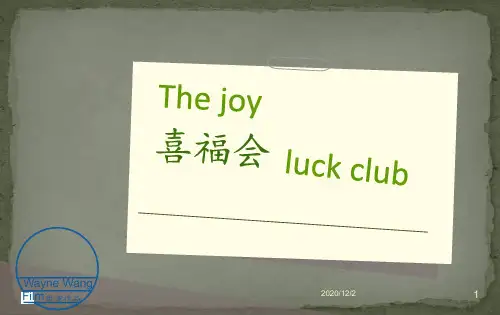
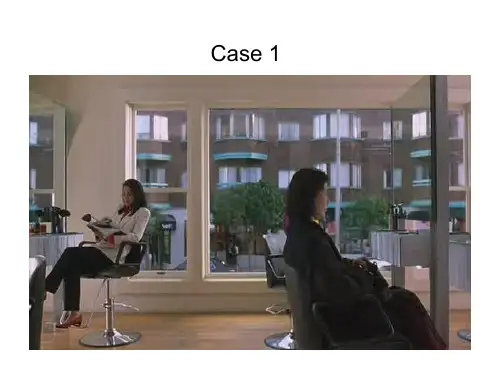
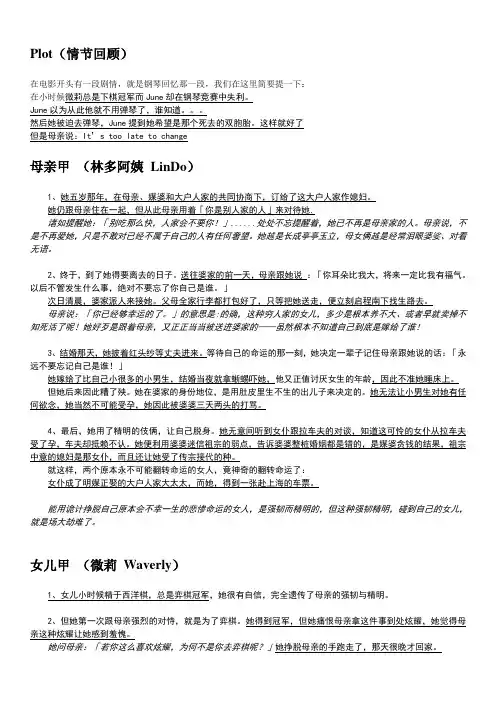
Plot(情节回顾)在电影开头有一段剧情,就是钢琴回忆那一段,我们在这里简要提一下:在小时候微莉总是下棋冠军而June却在钢琴竞赛中失利。
June以为从此他就不用弹琴了,谁知道。
然后她被迫去弹琴,June提到她希望是那个死去的双胞胎。
这样就好了但是母亲说:It’s too late to change母亲甲(林多阿姨LinDo)1、她五岁那年,在母亲、媒婆和大户人家的共同协商下,订给了这大户人家作媳妇。
她仍跟母亲住在一起,但从此母亲用着「你是别人家的人」来对待她.诸如提醒她:「别吃那么快,人家会不要你!」......处处不忘提醒着,她已不再是母亲家的人。
母亲说,不是不再爱她,只是不敢对已经不属于自己的人有任何奢望。
她越是长成亭亭玉立,母女俩越是经常泪眼婆娑、对看无语。
2、终于,到了她得要离去的日子。
送往婆家的前一天,母亲跟她说:「你耳朵比我大,将来一定比我有福气。
以后不管发生什么事,绝对不要忘了你自己是谁。
」次日清晨,婆家派人来接她。
父母全家行李都打包好了,只等把她送走,便立刻启程南下找生路去。
母亲说:「你已经够幸运的了。
」的意思是:的确,这种穷人家的女儿,多少是根本养不大、或者早就卖掉不知死活了呢!她好歹是跟着母亲,又正正当当被送进婆家的——虽然根本不知道自己到底是嫁给了谁!3、结婚那天,她披着红头纱等丈夫进来。
等待自己的命运的那一刻,她决定一辈子记住母亲跟她说的话:「永远不要忘记自己是谁!」她嫁给了比自己小很多的小男生,结婚当夜就拿蜥蜴吓她,他又正值讨厌女生的年龄,因此不准她睡床上。
但她后来因此糟了殃。
她在婆家的身份地位,是用肚皮里生不生的出儿子来决定的。
她无法让小男生对她有任何欲念,她当然不可能受孕,她因此被婆婆三天两头的打骂。
4、最后,她用了精明的伎俩,让自己脱身。
她无意间听到女仆跟拉车夫的对谈,知道这可怜的女仆从拉车夫受了孕,车夫却抵赖不认。
她便利用婆婆迷信祖宗的弱点,告诉婆婆整桩婚姻都是错的,是媒婆贪钱的结果,祖宗中意的媳妇是那女仆,而且还让她受了传宗接代的种。
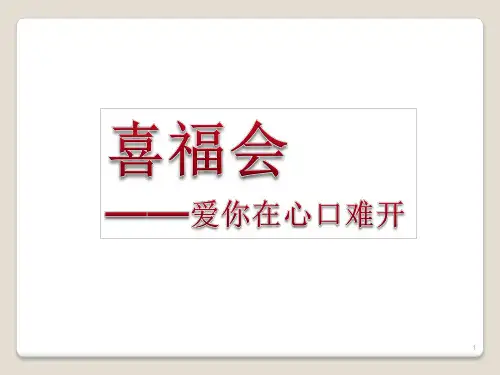
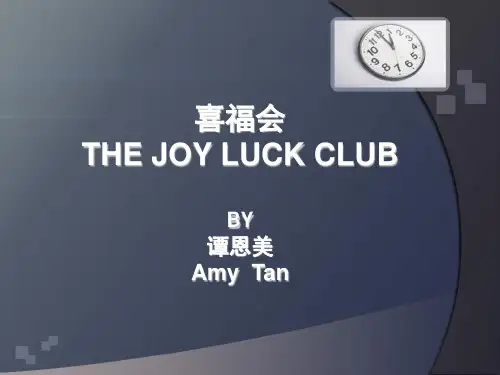
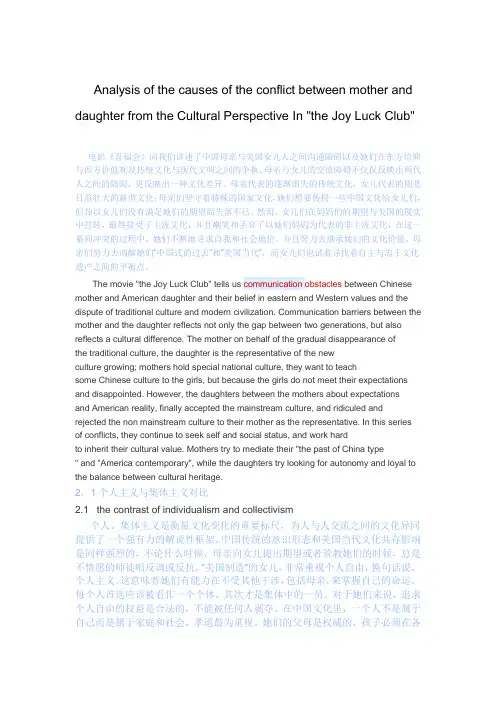
Analysis of the causes of the conflict between mother and daughter from the Cultural Perspective In "the Joy Luck Club"电影《喜福会》向我们讲述了中国母亲与美国女儿人之间沟通障碍以及她们在东方信仰与西方价值观及传统文化与现代文明之间的争执。
母亲与女儿的交流障碍不仅仅反映出两代人之间的隔阂,更反映出一种文化差异。
母亲代表的逐渐消失的传统文化,女儿代表的则是日益壮大的新型文化;母亲们坚守着特殊的国家文化,她们想要传授一些中国文化给女儿们,但却以女儿们没有满足她们的期望而失落不已。
然而,女儿们在妈妈们的期望与美国的现实中打转,最终接受了主流文化,并且嘲笑和丢弃了以她们妈妈为代表的非主流文化,在这一系列冲突的过程中,她们不断地寻求自我和社会地位,并且努力去继承她们的文化价值。
母亲们努力去调解她们“中国式的过去”和“美国当代”,而女儿们也试着寻找着自主与忠于文化遗产之间的平衡点。
The movie "the Joy Luck Club" tells us communication obstacles between Chinese mother and American daughter and their belief in eastern and Western values and the dispute of traditional culture and modern civilization. Communication barriers between the mother and the daughter reflects not only the gap between two generations, but also reflects a cultural difference. The mother on behalf of the gradual disappearance ofthe traditional culture, the daughter is the representative of the newculture growing; mothers hold special national culture, they want to teachsome Chinese culture to the girls, but because the girls do not meet their expectations and disappointed. However, the daughters between the mothers about expectationsand American reality, finally accepted the mainstream culture, and ridiculed andrejected the non mainstream culture to their mother as the representative. In this seriesof conflicts, they continue to seek self and social status, and work hardto inherit their cultural value. Mothers try to mediate their "the past of China type" and "America contemporary", while the daughters try looking for autonomy and loyal to the balance between cultural heritage.2.1个人主义与集体主义对比2.1 the contrast of individualism and collectivism个人、集体主义是衡量文化变化的重要标尺,为人与人交流之间的文化异同提供了一个强有力的解说性框架。
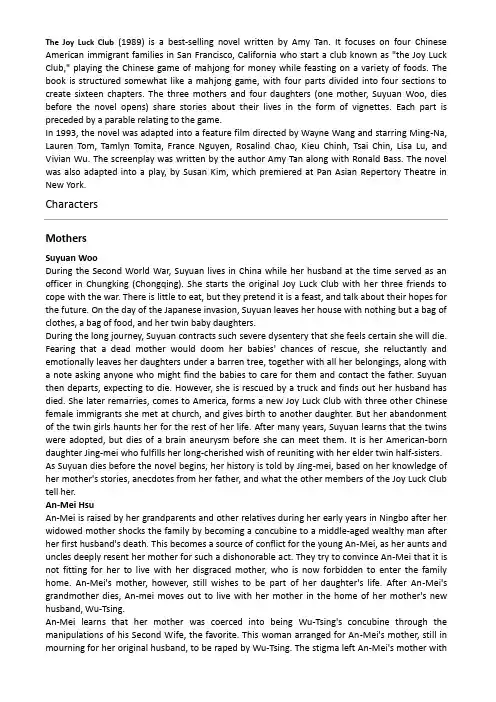
The Joy Luck Club(1989) is a best-selling novel written by Amy Tan. It focuses on four Chinese American immigrant families in San Francisco, California who start a club known as "the Joy Luck Club," playing the Chinese game of mahjong for money while feasting on a variety of foods. The book is structured somewhat like a mahjong game, with four parts divided into four sections to create sixteen chapters. The three mothers and four daughters (one mother, Suyuan Woo, dies before the novel opens) share stories about their lives in the form of vignettes. Each part is preceded by a parable relating to the game.In 1993, the novel was adapted into a feature film directed by Wayne Wang and starring Ming-Na, Lauren Tom, Tamlyn Tomita, France Nguyen, Rosalind Chao, Kieu Chinh, Tsai Chin, Lisa Lu, and Vivian Wu. The screenplay was written by the author Amy Tan along with Ronald Bass. The novel was also adapted into a play, by Susan Kim, which premiered at Pan Asian Repertory Theatre in New York.CharactersMothersSuyuan WooDuring the Second World War, Suyuan lives in China while her husband at the time served as an officer in Chungking (Chongqing). She starts the original Joy Luck Club with her three friends to cope with the war. There is little to eat, but they pretend it is a feast, and talk about their hopes for the future. On the day of the Japanese invasion, Suyuan leaves her house with nothing but a bag of clothes, a bag of food, and her twin baby daughters.During the long journey, Suyuan contracts such severe dysentery that she feels certain she will die. Fearing that a dead mother would doom her babies' chances of rescue, she reluctantly and emotionally leaves her daughters under a barren tree, together with all her belongings, along with a note asking anyone who might find the babies to care for them and contact the father. Suyuan then departs, expecting to die. However, she is rescued by a truck and finds out her husband has died. She later remarries, comes to America, forms a new Joy Luck Club with three other Chinese female immigrants she met at church, and gives birth to another daughter. But her abandonment of the twin girls haunts her for the rest of her life. After many years, Suyuan learns that the twins were adopted, but dies of a brain aneurysm before she can meet them. It is her American-born daughter Jing-mei who fulfills her long-cherished wish of reuniting with her elder twin half-sisters. As Suyuan dies before the novel begins, her history is told by Jing-mei, based on her knowledge of her mother's stories, anecdotes from her father, and what the other members of the Joy Luck Club tell her.An-Mei HsuAn-Mei is raised by her grandparents and other relatives during her early years in Ningbo after her widowed mother shocks the family by becoming a concubine to a middle-aged wealthy man after her first husband's death. This becomes a source of conflict for the young An-Mei, as her aunts and uncles deeply resent her mother for such a dishonorable act. They try to convince An-Mei that it is not fitting for her to live with her disgraced mother, who is now forbidden to enter the family home. An-Mei's mother, however, still wishes to be part of her daughter's life. After An-Mei's grandmother dies, An-mei moves out to live with her mother in the home of her mother's new husband, Wu-Tsing.An-Mei learns that her mother was coerced into being Wu-Tsing's concubine through the manipulations of his Second Wife, the favorite. This woman arranged for An-Mei's mother, still in mourning for her original husband, to be raped by Wu-Tsing. The stigma left An-Mei's mother withno choice but to marry Wu-Tsing and become his new but lowly Fourth Wife. She later lost her baby son to Second Wife, who claimed the boy as her own child to ensure her place in the household. Second Wife also tried to win over An-mei upon her arrival in Wu-Tsing's mansion, giving her a necklace made of "pearls" that her mother later revealed were actually glass beads by crushing one with her teacup. An-Mei's mother re-knots the necklace to hide the missing bead, but now An-Mei knows the truth about Second Wife's seeming generosity.Wu-Tsing is a highly superstitious man, and Second Wife takes advantage of this weakness by making false suicide attempts and threatening to haunt him as a ghost if he does not let her have her way. According to Chinese tradition, a person's soul comes back after three days to settle scores with the living. Wu-Tsing, therefore, is known to be afraid to face the ghost of an angry or scorned wife. After Second Wife fakes a suicide attempt to prevent An-Mei and her mother from getting their own small house, An-Mei's mother successfully commits suicide herself, eating tangyuan laced with lethal amounts of opium. She times her death so that her soul is due to return on the first day of the new year, a day when all debts must be settled lest the debtor suffer great misfortune. With this in mind, Wu-Tsing promises to treat his Fourth Wife's children, including An-Mei, as if they were his very own flesh and blood by an honored First Wife. When Second Wife attempts to disrupt this, An-Mei crushes the fake pearl necklace Second Wife gave her beneath her feet to show her awareness of all Second Wife's deception and to symbolize her new power over Second Wife, who now fears her and realizes the bad karma she has brought upon herself.An-Mei later immigrates to America, marries, and gives birth to seven children (four sons, three daughters). The youngest, a son named Bing, drowns at age four.Lindo JongLindo is a strong-willed woman, a trait that her daughter Waverly attributes to her having been born in the year of the Horse. When Lindo was only twelve, she was forced to move in with a neighbor's young son, Huang Tyan-yu, through the machinations of the village matchmaker. After some training for household duties through her in-laws, she and Tyan-yu married when she turned sixteen. She soon realized that her husband was just a little boy at heart and had no sexual interest in her. Lindo began to care for her husband as a brother, but her cruel mother-in-law expected Lindo to produce a grandson. She restricted most of Lindo's daily activities, eventually ordering her to remain on bed rest until she could conceive and deliver a child.Determined to escape this unfortunate situation, Lindo carefully observed the other people in the household and eventually formed a clever plan to escape her marriage without dishonoring herself or her family. She managed to trick her young husband's family into believing that he was actually fated to marry another girl who was already pregnant with his "spiritual child", and that her marriage to Huang Tyan Yu would only bring bad luck to the family. In reality, the girl in question was a mere servant in the household and indeed pregnant, but abandoned by her lover.Freed from her first marriage, Lindo decided to emigrate to America. She married a Chinese-American man named Tin Jong and has three children: sons Winston and Vincent, and daughter Waverly.Lindo experiences regret over losing some of her Chinese identity by living so long in America (she is treated like a tourist on a visit to China); however, she expresses concern that Waverly's American upbringing has formed a barrier between them.Ying-Ying "Betty" St. ClairFrom a young age, Ying-Ying is told by her wealthy and conservative family that Chinese girls should be meek and gentle. This is especially difficult for her, she feels, because she is a Tiger character. She begins to develop a passive personality and repress her feelings as she grows up in Wuxi. Ying-Ying marries a charismatic man named Lin Xiao, not out of love, but because she believed it was her fate. Her husband is revealed to be abusive and openly has extramaritalrelationships with other women. When Ying-Ying discovers she is pregnant, she gets an abortion and makes the decision to live with her relatives in a smaller city in China.After ten years, she moves to Shanghai and works in a clothing store, where she meets an American man named Clifford St. Clair. He falls in love with her, but Ying-Ying cannot express any strong emotion after her first marriage. He courts her for four years before she agrees to marry him after learning that Lin Xiao had died, which she takes as the proper sign to move on. She allows Clifford to control most aspects of her life, mistranslating her words and actions, and even changing her name to "Betty". Ying-Ying gives birth to her daughter, Lena, after moving to San Francisco with St. Clair. When Lena is around ten years old, Ying-Ying becomes pregnant a third time, but the baby boy is anencephalic and soon dies.Ying-Ying is horrified when she realizes that Lena, a Tiger like herself, has inherited or emulated her passive behaviors and trapped herself in a loveless marriage with a controlling husband. She finally resolves to call upon the more assertive qualities of her Tiger nature, to appeal to those qualities in Lena. She will tell Lena her story in the hope that she will be able to break free from the same passivity that ruined most of her young life back in China.DaughtersJing-Mei "June" WooJing-Mei has never fully understood her mother and seems directionless in life. During June's childhood, her mother used to tell her that she could be anything she wants; however, she particularly wanted her daughter to be gifted, a child star who amazes the world, like Ginny Tiu (seen briefly on television) or June's rival Waverly. At the beginning of the novel, June is chosen to replace her mother's seat in the Joy Luck Club after her mother's death. At the end of the novel, June is still trying to deal with her mother's death, and she visits China to see the twin half-sisters (Wang Chwun Yu and Wang Chwung Hwa) whom her mother had been forced to abandon when the Japanese attacked China.One critic[who] has suggested[1] that the reason for the communication gap between Jing-Mei and her mother, and between the other daughters and their mothers—a major theme of the novel—occurs because the mothers come from a high context culture and the Americanized daughters from a low context culture. The mothers believe that the daughters will intuitively understand their cryptic utterances, but the daughters don't understand them at all.Rose Hsu JordanRose is somewhat passive and is a bit of a perfectionist. She had an unsettling childhood experience when her youngest brother, Bing, drowned while she was supposed to be watching him, and his body was never recovered. Rose marries a doctor, Ted Jordan, who loves her but also wants to spite his snooty, racist mother. After a malpractice suit, Ted has a mid-life crisis and decides to leave Rose. Rose confides in her mother and An-mei tells her the story of her own childhood. When Ted comes for the divorce papers, Rose finds her voice and tells him that he can't just throw her out of his life, comparing herself to his garden, once so beloved, now unkempt and full of weeds. An-Mei tells her that Ted has been cheating on her, which Rose thinks is absurd, but she later discovers this to be true. She wants to hire a good lawyer and fight for possession of the house, which she eventually wins.Waverly JongWaverly is an independent-minded and intelligent woman, but is annoyed by her mother's constant criticism. Well into her adult life, she finds herself restrained by her subconscious fear of letting her mother down. During their childhood, June and Waverly become childhood rivals; their mothers constantly compared their daughter's development and accomplishments. Waverly was once a gifted chess champion, but quit after feeling that her mother was using her daughter'stalent to show off, taking credit for Waverly's wins. She has a daughter, Shoshana, from her first marriage with Marvin, and is currently engaged to her boyfriend Rich Shields.Lena St. ClairThroughout Lena's childhood, she gradually becomes her mother's voice and interprets her mother's Chinese words for others. Like her father Clifford, she translates Ying-ying's words to sound more pleasant than what Ying-ying actually says. Ying-ying has taught Lena to beware of consequences, to the extent that Lena visualizes disaster in the taking of any risk. Lena's husband, Harold, is also her boss. He takes the credit for Lena's business and design ideas. He demands financial "equality" in their marriage. Lena is an associate while Harold is a partner, so he has a larger salary than she does. However, he insists that all household expenses be divided equally between them. Harold believes that by making everything equal, they can make their love equal as well. Lena feels frustrated and powerless.Table of contentsFeathers from a Thousand Li Away"The Joy Luck Club," Jing-mei "June" Woo"Scar," An-Mei Hsu"The Red Candle," Lindo Jong"The Moon Lady," Ying-Ying St ClairThe Twenty-Six Malignant Gates"Rules of the Game," Waverly Jong"The Voice from the Wall," Lena St. Clair"Half and Half," Rose Hsu Jordan"Two Kinds," Jing-mei "June" WooAmerican Translation"Rice Husband," Lena St. Clair"Four Directions," Waverly Jong"Without Wood," Rose Hsu Jordan"Best Quality," Jing-mei "June" WooQueen Mother of the Western Skies"Magpies," An-mei Hsu"Waiting Between the Trees," Ying-Ying St. Clair"Double Face," Lindo Jong"A Pair of Tickets," Jing-mei "June" WooCriticismThough Amy Tan's book has been widely praised by critics, it has also been alleged by Chinese-American author Frank Chin that it perpetuates racist stereotypes.[2][3][4] Chinese-American director Wayne Wang was impressed with the story and created a film version of the novel.[5]References^ CUNY Brooklyn article^ Come All Ye Asian American Writers of the Real and the Fake^ The Joy Luck Club^ Review: The Joy Luck Club^ "Asian images in film spotlight - The Joy Luck Club". Turner Classic Movies. Retrieved 3 July 2008.。
